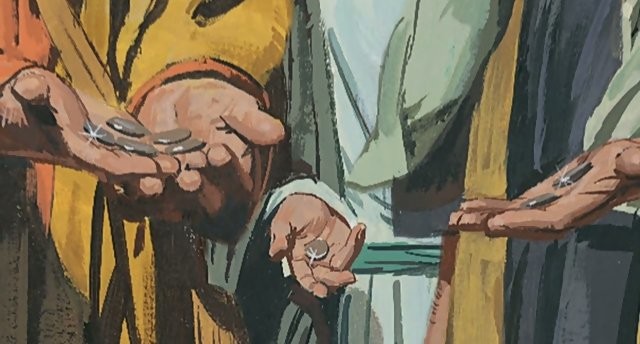
Taken by itself, today’s gospel offers a terrifying image of what it means to be a Christian. It is therefore a popular parable among those whose entire theology is one of fear and vengeance – those who would rather picture the hands of Jesus closed in a fist rather than open on the cross.
“From those that have nothing, even what they have will be taken away.” Tough words!
Fortunately, this short passage is not the sum of our understanding of the teachings of Jesus. This is a reminder that our call to serve God is lived out in the context of our ordinary activities that are done well and for the glory of God.
The comedian, Steven Wright once said, “I started off with nothing. I’ve still got most of it.” The same could be said of the servant with one talent in today’s gospel.
What is the message of today’s gospel parable? Simply this: a Christian is a person who must put themselves at risk. The master gives money to two of the servants, they put the money to work, make a profit and make their master happy. These two men took risks. What kind of risks? Well, the investment they made could have failed. They could have had nothing to return to the master at all, not even the principal. They took a chance however, succeeded, and made their master happy. For each of us today the message is the need to respond to God’s grace by making a genuine effort throughout our life. God has given us gifts and he expects us to use them in his service and for the service of others. It doesn’t matter how many gifts we have received. What matters is our generosity in putting those gifts to good use.
It’s precisely this willingness to take risks that the master finds lacking in the third servant. He did not put the money to work because he was afraid he might lose it. Because of his fear, the master received no profit. Now he would lose everything.
That is the challenge that Jesus is laying down in today’s Gospel. The religious leaders of the time – the scribes and Pharisees – had become obsessively cautious. Any change, any development, any alteration, anything new was impossible. Their approach had induced a religious paralysis which Christ was determined to challenge. For Christ there is no place for the closed mind in religious thinking.
His declaration is that to each has been given different abilities which will contribute to the growth of the kingdom. Although people are not equal in talent, it is expected that each will work to the best of their ability. The person who does not even make an effort is in serious trouble. Christ makes no bones about it: use it or lose it.
So why is it that people hold back on doing their best to use their God given talents? For some it’s the “if only syndrome” – If only I’d known – If only I had listened – If only I had studied harder – For others it’s the “but” word, I hear what you are saying but… I could have done that but… Others hold back for fear of being criticized — usually by those who are doing nothing. All such excuses stifle the present moment, and, the possibilities that are at hand are lost.
An ancient Persian sage commented “Four things come not back: The spoken word, the sped arrow, time past, the neglected opportunity.” Fortunately, with Christ there are second chances.
The big question is – in what areas of life is it important to show this constant growth? Basically, it is in our spiritual development where it is expected that our faith in and acceptance of Christ will continue to grow. Consequently, as we grow stronger in our faith, our sense of hope in the promises given by Christ becomes more real. As these two basic virtues — faith and hope — strengthen and grow, the virtue of Love grows, until Love motivates us rather than fear. Such and attitude will impact our everyday lives and relationships. It is at that point we have a better understanding of the opportunities that come our way to use our talents.
Faith leads to hope. Together they lead to love.
To tell you the truth, if fear was the only reason for my faith, I wouldn’t be a Catholic. If we were expected to simply scurry about in abject fear, never sure if we had done enough – it would seem terribly cruel, arbitrary, and unfair. That’s why I believe Matthew waited until the end of his gospel to share this particular story. It’s not intended for people who have not heard the other parables in Matthew’s gospel that we have heard this year. It’s not intended for those of who have not seen the amazing mercy and compassion of God lived out in the story of Jesus’ life.
But this story is for those of us who have paid attention, who have decided that the life of a believer is the path we wish to follow. For those of us who have already experienced the forgiveness of God, this is the other half of the equation. Accepting the gospel of Jesus means obligation as well as absolution.
It means work as well as peace, and action as well as acceptance.
We are not Christians because of what we believe. We are not Christians because of where we go to church. We are Christians because of – and only because of – whom we serve; and we demonstrate that service by our actions.
We must discover God in our ordinary everyday life. We should seek the hand of the invisible God at work and at home in visible and material things. There is no other way. We should not look for great signs and wonders to assurance that we are on the path to God. Instead, we can see confirmation of our faith by recognizing the goodness of God providing for our needs each day.
We must try to live out our vocation with a strong faith, hope and love for God and our neighbor, recognizing that one day we will stand before God and have to give an account of what we did with our lives.
We must live no longer for ourselves, but for Christ. We need to dig up our buried talents and put them at his service.
Trust that God has blessed you with the gifts you need — and use them.
-Dcn. Terry Murphy

